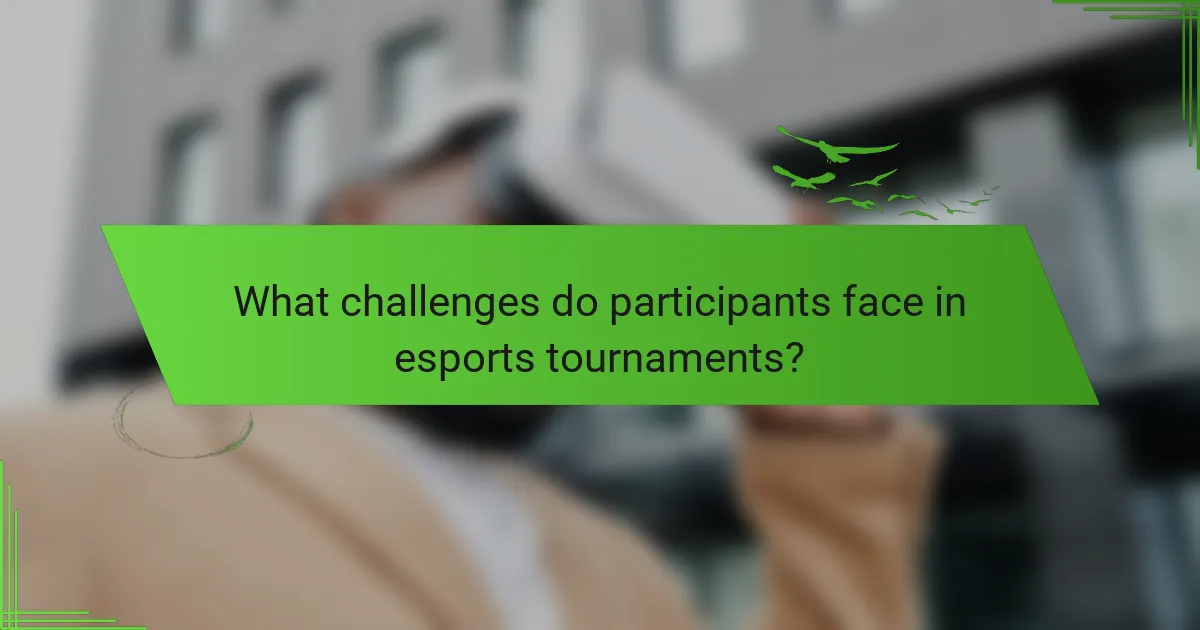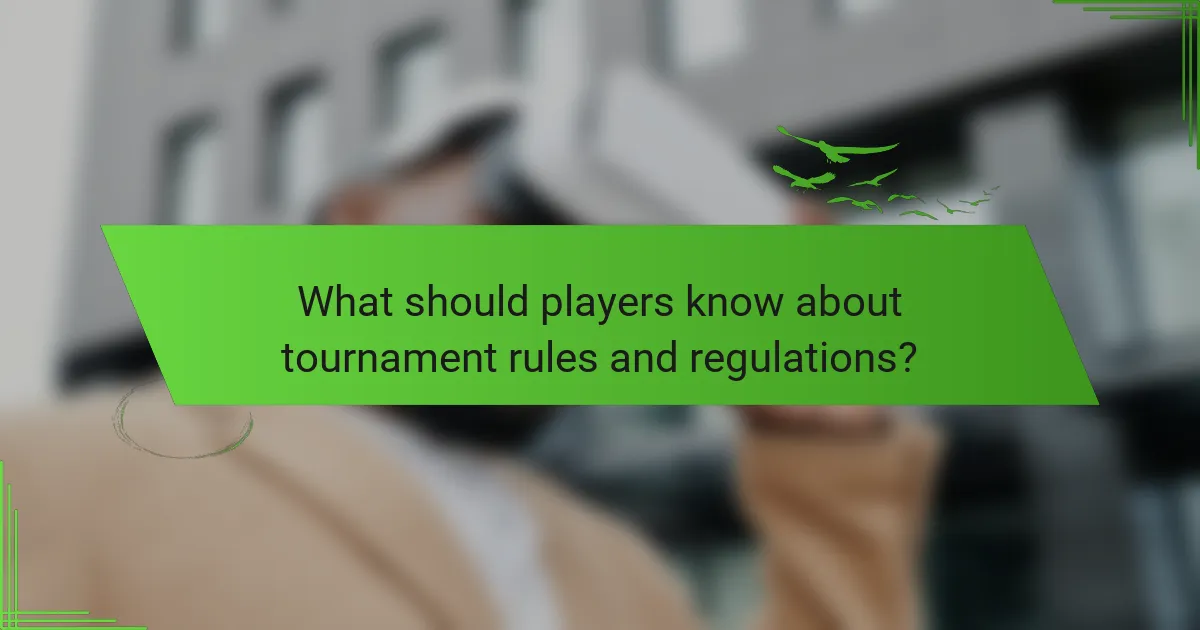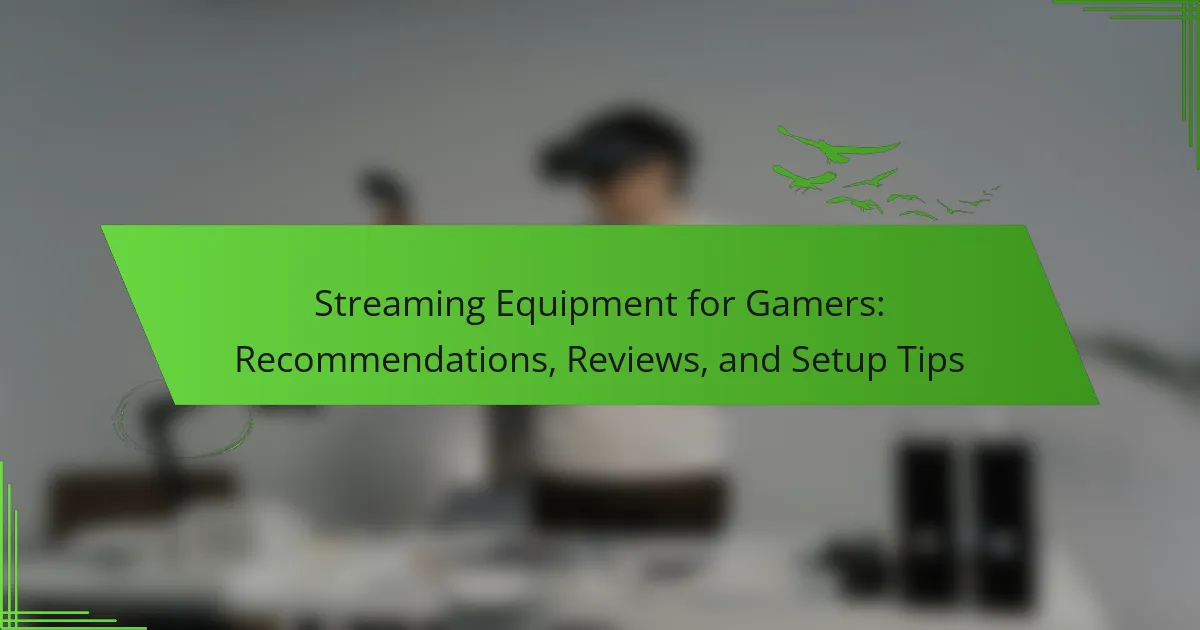Esports tournaments offer players opportunities for skill development, networking, and financial rewards. They feature various structures like single-elimination and round-robin formats. Major platforms such as Twitch and ESL host these events, providing essential services for participants. Understanding tournament rules and preparation strategies is crucial for success in this competitive landscape.

What are the different formats of esports tournaments?
Esports tournaments can be structured in various formats. Common formats include single-elimination, double-elimination, round-robin, and Swiss system. Each format offers unique benefits, such as the single-elimination’s straightforward progression or the round-robin’s comprehensive match exposure. Understanding these formats helps players and fans engage effectively.
How do single-elimination tournaments work?
Single-elimination tournaments consist of knockout rounds where teams compete in matches, and the loser is eliminated from the competition. Each round reduces the number of participants until one team remains as the champion. This format is efficient, often requiring fewer matches than other styles, making it popular in esports. Teams must perform at their best in every match, as one loss results in elimination. The excitement and intensity of single-elimination tournaments contribute to their appeal among players and fans alike.
What is the structure of double-elimination tournaments?
A double-elimination tournament has a structure that allows participants to compete until they lose twice. Each player or team enters the main bracket and, upon losing, moves to a lower bracket where they still have a chance to win the tournament. This format ensures that even a single loss does not eliminate a contender, providing a fairer competitive environment. The final match often features the winner of the upper bracket against the winner of the lower bracket, with the latter needing to win twice to claim the championship. This structure enhances engagement and excitement, making it popular in esports competitions.
Which tournaments use round-robin formats?
Many esports tournaments utilize round-robin formats, including major events like the League of Legends World Championship, The International for Dota 2, and the Overwatch League. This format allows each team to compete against every other team, ensuring a comprehensive evaluation of performance. Round-robin tournaments are favored for their fairness and ability to provide a clear ranking of teams based on their overall performance.
How do league-based tournaments operate?
League-based tournaments operate by organizing teams into divisions or leagues, where they compete in a structured format over a season. Each league typically follows a round-robin format, where teams play against each other to earn points based on their performance. The top teams advance to playoffs, culminating in a championship match. This structure enhances competitive integrity and allows for a clear progression toward a final winner. Additionally, league-based tournaments foster community engagement and provide consistent competition opportunities for players and fans alike.

What are the key benefits of participating in esports tournaments?
Participating in esports tournaments offers numerous benefits, including skill development, networking opportunities, and potential financial rewards. Players enhance their gaming abilities through competitive practice and exposure to diverse strategies. Networking with other gamers and industry professionals can lead to collaborations and career advancements. Additionally, top performers may earn prize money and sponsorships, making participation financially rewarding.
How do esports tournaments enhance player skills?
Esports tournaments significantly enhance player skills through structured competition and strategic gameplay. Participants face diverse opponents, fostering adaptability and critical thinking. The high-pressure environment encourages quick decision-making and teamwork, essential for success. Regular participation in tournaments leads to improved mechanics and game knowledge, ultimately elevating overall performance.
What networking opportunities arise from tournament participation?
Participating in esports tournaments creates valuable networking opportunities among players, teams, sponsors, and industry professionals. These connections can lead to collaborations, sponsorships, and career advancements. Players often meet potential teammates or coaches, while organizations can discover talent and build brand partnerships. Additionally, tournaments attract media coverage, enhancing visibility for all involved.
How can esports tournaments impact career prospects?
Esports tournaments can significantly enhance career prospects by providing networking opportunities, skill development, and exposure to potential employers. Participants often gain valuable experience and recognition in the gaming industry. Additionally, success in tournaments can lead to sponsorship deals and job offers from organizations seeking talent. This competitive environment fosters teamwork and strategic thinking, essential skills in various professional fields.

What are the major platforms hosting esports tournaments?
Major platforms hosting esports tournaments include Twitch, YouTube Gaming, ESL, DreamHack, and FACEIT. These platforms provide a variety of services for streaming, organizing, and promoting esports events. Twitch leads in audience engagement, while YouTube Gaming offers robust video-on-demand features. ESL and DreamHack focus on large-scale tournaments, attracting top players and teams. FACEIT specializes in competitive matchmaking and community-driven events, enhancing player participation. Each platform has unique attributes that cater to different aspects of the esports ecosystem.
How does Twitch contribute to esports tournaments?
Twitch significantly enhances esports tournaments by providing a platform for live streaming, audience engagement, and community building. The service allows players and teams to showcase their skills to a global audience, increasing visibility and sponsorship opportunities. Additionally, Twitch’s interactive features enable real-time viewer participation, enhancing the overall experience. This engagement can lead to higher viewer retention and increased revenue through subscriptions and donations.
What role does YouTube Gaming play in tournament coverage?
YouTube Gaming plays a crucial role in esports tournament coverage by providing a platform for live streaming and community engagement. It allows fans to watch matches in real-time, interact with streamers, and access highlights and replays. This enhances viewer experience and increases tournament visibility. Additionally, YouTube Gaming supports monetization options for content creators, incentivizing them to cover more events and attract larger audiences.
Which platforms are emerging for esports events?
Several platforms are emerging for esports events, enhancing accessibility and engagement. Notable platforms include Twitch, YouTube Gaming, Facebook Gaming, and Discord, which facilitate live streaming and community interaction. These platforms offer unique features, such as interactive chat and viewer participation, attracting both players and audiences. As esports continues to grow, these platforms will likely evolve, providing new opportunities for tournaments and fan engagement.

How can players get involved in esports tournaments?
Players can get involved in esports tournaments by registering for events, joining teams, and participating in qualifiers. Many tournaments offer online platforms for registration, allowing players to sign up individually or as part of a team. Networking within gaming communities can also provide opportunities to join established teams. Additionally, players can improve their skills through practice and by participating in smaller tournaments before aiming for larger competitions. Engaging with streaming platforms and social media can help players stay informed about upcoming tournaments and community events.
What are the steps to register for tournaments?
To register for esports tournaments, follow these steps:
1. Research available tournaments that fit your skill level and game preference.
2. Create an account on the tournament platform or organizer’s website.
3. Fill out the registration form with your gamer tag, team information, and contact details.
4. Pay any registration fees if required.
5. Confirm your registration through the email or notification received.
6. Prepare for the tournament by practicing and reviewing the rules.
How can players find local tournaments to participate in?
Players can find local tournaments by checking community forums, gaming websites, and social media groups. Many esports platforms host event listings, where players can filter by location and game type. Local gaming centers often organize tournaments, providing a great opportunity to meet other players. Additionally, participating in online tournaments can lead to information about nearby events.
What resources are available for aspiring esports competitors?
Aspiring esports competitors can access various resources to enhance their skills and knowledge. These include online training platforms, community forums, coaching services, and local gaming clubs. Additionally, many tournaments offer guides and workshops to help newcomers understand the competitive landscape. Networking with experienced players and attending esports events can provide valuable insights and opportunities for growth.

What challenges do participants face in esports tournaments?
Participants in esports tournaments face challenges such as intense competition, high-pressure environments, and the need for teamwork. These factors can lead to stress and burnout. Additionally, players must navigate technical issues, time zone differences, and varying levels of skill among opponents. The commitment to training and preparation also adds to the demands on participants.
How do time zone differences affect international tournaments?
Time zone differences significantly impact international esports tournaments by affecting scheduling and player performance. Coordinating matches across multiple time zones can lead to inconvenient playtimes for participants, potentially impacting their focus and energy levels. For example, a tournament hosted in Europe may require players from North America to compete late at night, which could hinder their performance. Additionally, audience engagement may decline if matches occur at unfavorable times, reducing viewership and sponsorship opportunities. Overall, careful planning around time zones is crucial for the success of international esports events.
What are common technical issues players encounter?
Players commonly encounter technical issues such as connectivity problems, server lag, and hardware malfunctions during esports tournaments. These issues can disrupt gameplay and affect overall performance. Connectivity problems often arise from unstable internet connections, leading to delays or disconnections. Server lag occurs when the tournament servers experience high traffic, resulting in slow response times. Hardware malfunctions can include issues with peripherals like mice, keyboards, or headsets, impacting player control and communication. Addressing these common technical issues is crucial for a smooth tournament experience.
How can participants manage performance anxiety during tournaments?
Participants can manage performance anxiety during tournaments by implementing effective strategies. Techniques such as deep breathing, visualization, and positive self-talk can significantly reduce anxiety levels. Establishing a pre-tournament routine helps create familiarity and comfort. Regular practice in high-pressure scenarios can also build confidence. Additionally, maintaining a healthy lifestyle with adequate sleep and nutrition supports mental well-being. Engaging in discussions with peers or mentors can provide reassurance and valuable insights.

Which notable esports tournaments have shaped the industry?
Several notable esports tournaments have significantly influenced the industry. Events like The International, League of Legends World Championship, and ESL One have set benchmarks for prize pools and viewership. The International, for instance, boasts a prize pool exceeding $40 million, showcasing community-driven funding. The League of Legends World Championship attracts millions of viewers globally, emphasizing the game’s popularity. ESL One has pioneered live event experiences, enhancing audience engagement. Collectively, these tournaments have shaped esports into a mainstream entertainment sector.
What impact has The International had on esports growth?
The International has significantly accelerated esports growth by elevating its visibility and legitimacy. The tournament showcases top-tier talent and offers substantial prize pools, attracting millions of viewers globally. This exposure has led to increased sponsorship and investment in the esports industry. Additionally, The International fosters community engagement, encouraging more players to participate in esports. The unique structure of the event, including crowd-funded prize pools, sets a precedent for future tournaments, enhancing the overall ecosystem of competitive gaming.
How has the League of Legends World Championship influenced player engagement?
The League of Legends World Championship has significantly boosted player engagement through its competitive structure and community involvement. The event attracts millions of viewers, fostering a sense of belonging among fans and players. As a result, many aspiring gamers are motivated to enhance their skills and participate in esports. The championship also provides a platform for professional teams to showcase their talent, which encourages more players to pursue careers in gaming. This cyclical effect enhances overall interest in esports and contributes to its growth.

What should players know about tournament rules and regulations?
Players should understand that tournament rules and regulations vary by event and game. Key aspects include eligibility, format, scoring systems, and conduct expectations. Familiarizing oneself with these elements ensures fair play and enhances the competitive experience. Additionally, some tournaments may have unique attributes, such as specific game versions or regional restrictions, which can impact participation. Always review the official tournament guidelines to stay informed and compliant.
How do rules vary between different esports titles?
Rules vary significantly between esports titles, reflecting their unique gameplay mechanics and competitive structures. Each game has its own set of regulations governing gameplay, player conduct, and tournament formats. For instance, in first-person shooters like Counter-Strike: Global Offensive, rules may focus on map control and team strategies, while in multiplayer online battle arenas like League of Legends, they emphasize champion selection and team synergy. Additionally, some titles have specific rules regarding match duration and scoring systems, contributing to their distinct competitive environments. Understanding these differences is crucial for players and teams looking to excel in esports tournaments.
What are the consequences of rule violations in tournaments?
Violating rules in esports tournaments can lead to disqualification, penalties, or bans. Consequences vary by severity of the violation and can affect both players and teams. Disqualification removes a participant from the competition, while penalties may include point deductions or match forfeits. Bans can be temporary or permanent, impacting future participation. Maintaining integrity is crucial in esports, as violations undermine fair play and competition.

What are best practices for succeeding in esports tournaments?
To succeed in esports tournaments, players should focus on preparation, teamwork, and adaptability. Developing skills through practice, understanding game mechanics, and maintaining physical and mental health are essential.
1. Set clear goals for improvement and performance.
2. Build a cohesive team with defined roles.
3. Analyze past performances to identify strengths and weaknesses.
4. Stay updated on game patches and meta changes.
5. Communicate effectively during matches.
6. Manage stress and maintain a balanced lifestyle.
How can players effectively prepare for competitions?
Players can effectively prepare for competitions by focusing on practice, strategy, and mental health. Consistent practice hones skills and reflexes. Developing game strategies tailored to opponents enhances performance. Additionally, maintaining mental well-being through rest and stress management improves focus. Nutrition and physical fitness also play crucial roles in overall readiness.
What strategies can enhance team collaboration during tournaments?
Effective strategies to enhance team collaboration during tournaments include establishing clear communication, setting defined roles, and conducting regular practice sessions. These approaches foster trust and synergy among team members. Utilizing collaborative tools, such as shared platforms for strategy discussions, can streamline coordination. Additionally, promoting a positive team culture encourages players to support each other, leading to improved performance and resilience under pressure.
How can participants maintain a healthy balance between practice and rest?
Participants can maintain a healthy balance between practice and rest by scheduling regular breaks and prioritizing recovery. Establishing a routine that includes both intensive training sessions and adequate downtime is crucial.
Incorporating physical activity during rest periods can enhance overall well-being and mental clarity. For example, light exercises or stretching can rejuvenate players and improve focus.
Monitoring fatigue levels is essential. Participants should listen to their bodies and adjust their schedules accordingly. This balance can lead to improved performance in esports tournaments.
Lastly, fostering a supportive community can encourage healthy habits. Engaging with peers about rest strategies can provide motivation and accountability.



